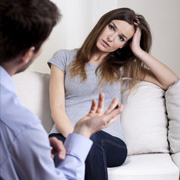
Understanding Obsessive-Compulsive Disorder
People with obsessive-compulsive disorder (OCD) often become the subject of a lack of understanding that focuses on the particular rituals they perform as a part of their disorder. The truth of the matter is that this particular anxiety disorder represents a very serious condition that often grips the victim’s mind with fear and, in a very real way, controls their lives.
Free OCD Test
If you think you might have OCD symptoms, take our Free Obsessive Compulsive Test. If you have any questions or need help with OCD, contact us immediately.
Individuals who suffer from OCD are held captive by unwanted thoughts (obsessions) that make them feel nervous or afraid. To get rid of these thoughts, the person will create a set of behavioral “rules” (compulsions) that must be repeated several times over. These self-imposed rituals generally only manage to dissipate the fear for a short time, which makes seeking treatment even more important.
Most Common OCD Obsessions
- A fear of dirt or germs
- Disgust with bodily waste or fluids
- Concern with order, balance, and exactness
- Worry that a task has been done poorly
- Need for constant reassurance
- Fear of harming a family member or friend
- Fear of thinking evil or sinful thoughts, and
- Thinking about certain words, images, sounds, or numbers all the time
Homosexual Obsessive Compulsive Disorder (HOCD)
Homosexual OCD (“HOCD”) is a specific subtype of obsessive-compulsive disorder (OCD) in which the person suffers from frequent and continued sexual obsessions and doubts about their own sexual orientation. As of this writing the term HOCD is not yet a scientific term but it has evolved within the OCD community to help describe the symptoms that accompany those who are hounded by thoughts about being gay.
Most Common OCD Compulsions
- Excessively repetitive cleaning and grooming
- Seeking constant reassurance and approval
- Ordering and arranging items in certain ways
- Counting to a certain number over and over
- Saving newspapers, mail, or containers when they are no longer needed
- Repeating actions, such as: going in and out of a door, sitting down and getting up from a chair, or touching certain objects several times
You Are Not Alone
Approximately 3 million Americans between the ages of 18 and 54 suffer from OCD, which tends to affect men and women equally. In adults, symptoms usually begin around age 21. If the disorder does start in childhood, signs are generally seen around age 10.
What Causes OCD?
There is no proven cause of obsessive-compulsive disorder, although many experts theorize that reduced serotonin levels in the brain can contribute to the condition. Others believe that the disorder stems from habits learned over time through someone’s environment.
Recommended Treatment For Obsessive Compulsive Disorder
The most effective remedy for OCD is a combination of therapy and medication. Psychotherapists will typically focus on Cognitive Behavior Therapy, which asks the patient to face the situations that trigger their obsessions. During these sessions the patient is encouraged not to perform their rituals as long as they’re able to tolerate the high levels of anxiety that can result from the experience. In addition, certain medications are helpful in reducing symptoms of OCD.
Treatment should be sought once an individual’s obsessions begin to rule their life. A person who suffers from this condition often spends the majority of their day repeating their rituals over and over. They have little time left for anything else because they’re so gripped by the need to obey compulsions they feel powerless to ignore. If your obsessions have reached this level, please contact us immediately for the most effective assistance.
What We Treat
The Center for Treatment and of Anxiety and Mood Disorders specializes in treating a wide variety of disorders including:
- Stress Disorders
- Sexual Dysfunction
- Substance Abuse/Alcohol Abuse
- ADD/ADHD
- Eating Disorders
- Menopausal Anxiety
- Other addictions and disorders
Types of Therapy
The Center offers cutting edge therapy designed to get you on the road to a speedy recovery. We will help you to learn how to live your daily life free from the fears or compulsions that inhibit you or your child’s ability to complete each day’s tasks.
More Ways to Get Help Now
We offer cognitive behavior therapy, psychodynamic psychotherapy, mindfulness meditation, group therapy. and medication. Depending on your needs, here’s how you can get help now:

Online or Phone
Therapy
For individuals around the country or those wanting help from the comfort of your own home, we offer therapy via Facetime, Skype or phone.

In Person
Treatment
We have professionals available 7 days a week. Our offices are conveniently located in the Boca/Delray area.

Intensive Weekend
Programs
For those who prefer a more short-term approach we offer weekend sessions for individuals or groups. Perfect for those with a less flexible work schedule.







